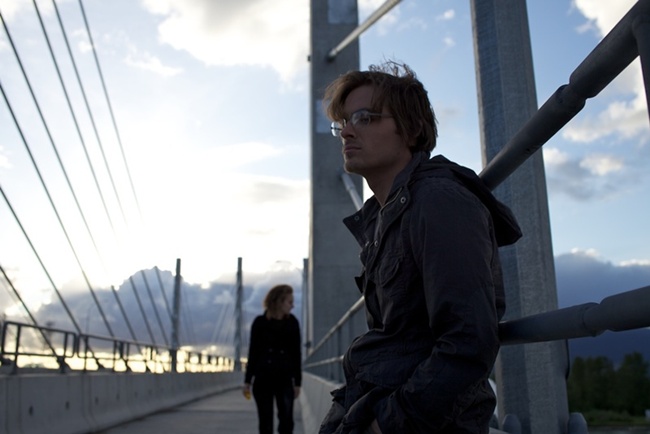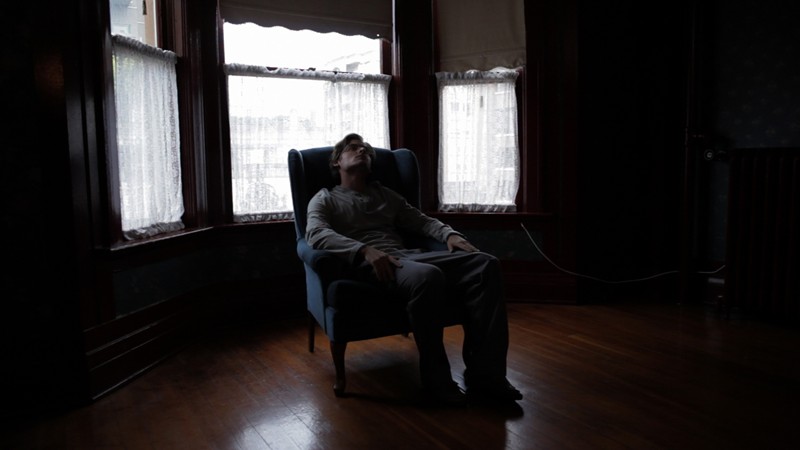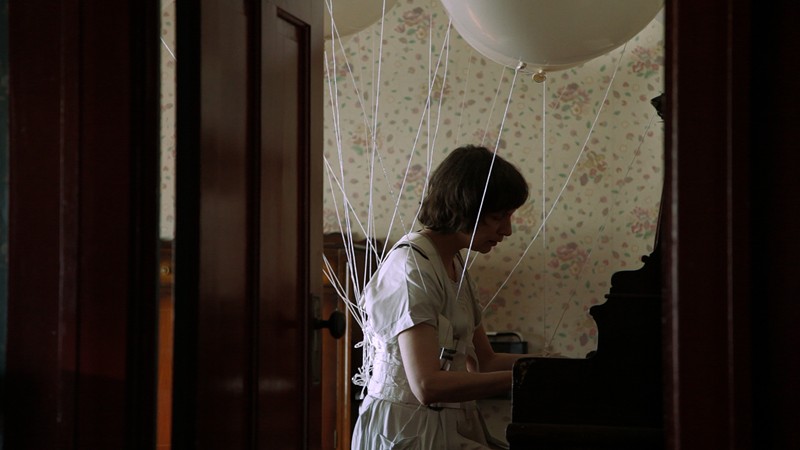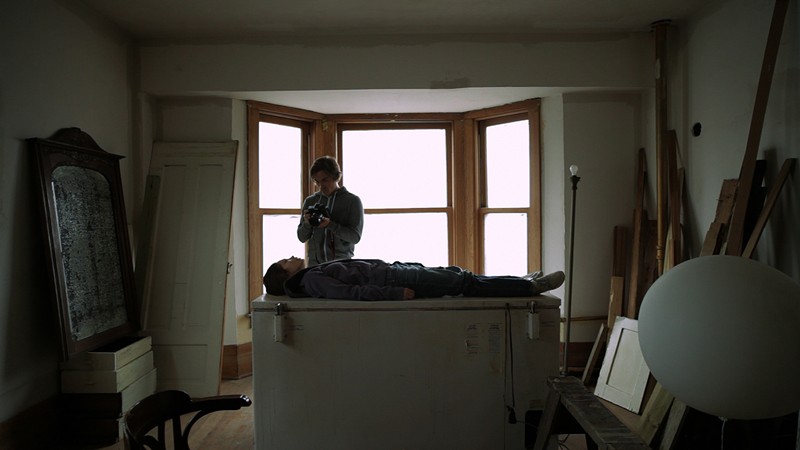ScreenAnarchy Visits The Set Of Shunji Iwai's VAMPIRE
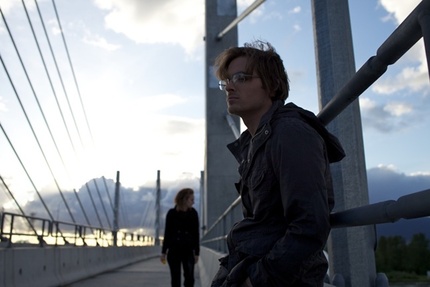
[Our thanks to Andrew David Long for the following report from the set of Shunji Iwai's debut English language feature, Vampire.]
Shunji Iwai's upcoming film Vampire will be treading about as far from Bela Lugosi territory as one can get, but if the writer/director of such critical favourites as Love Letter (1995), All About Lily Chou-Chou (2001), and Hana and Alice (2004) has his way, we will all leave the cinema with the coppery taste of blood lingering on our tongues. Despite having earned a reputation for artfully crafted depictions of teen angst and uncertainty, Vampire promises to turn Iwai's unique sensibilities towards a much darker path than any of his work to date. While his films have developed a loyal festival and art-house following in North America, Vampire will be pushing for a broader release; it's Iwai's first English-language feature, and he's working with a carefully assembled cast including Kevin Zegers, Amanda Plummer, Rachael Leigh Cook, and Keisha Castle-Hughes.
Zegers stars as Simon, a man with a predilection for the taste of blood, and the resourcefulness to find willing victims on a website for the suicidal. Given Iwai's track record of creating characters that have a highly developed fascination for the object of their affection, you can expect a delicate balance of compassion and utter immorality. Also, given that there have been a number of actresses doing short stints throughout the Vancouver shoot, expect something of a body count.
With the dense green forests of the North Vancouver mountainsides in a constant state of fog and drizzle, Iwai is reminded of Hokkaido, the northern island of Japan that draws close to Siberia. However much Iwai is or isn't at home, his actors are certainly navigating a somewhat foreign process. "According to Zegers, "Anytime I get a bearing of where I am, I sort of start all over again. I've been [acting] since I was a little kid, and this is like nothing I've ever done. It feels different, but it feels better." A notable sentiment coming from an actor who met with Iwai immediately after four days on the set of Sebastian Gutierrez's vignette-based piece Girl Walks Into a Bar, where he was doing a stick-up scene in a nudist ping-pong bar.
And for a film that feels better, how much time is he spending in a dark and morbid emotional state? "On this movie, 24-7... It feels very much like abuse, and I knew all along that this was going to be a very emotionally taxing thing, so I was prepared for the beat-down, and the incessant need to be in this dark, sort of funny place. I'm laughing a lot, but the sort of crazy laugh you see the guy in the corner doing."
Plummer, who met Iwai socially, accepted an invitation to join the cast early on. "I was out to dinner with Shunji and a bunch of mutual friends, and he went, 'Do you want to be...' and I went, 'Yes.' My heart soared. I think it's an absolute honour to work with him. Feeling him, feeling his thoughts, watching him shoot things, you can feel a life happening, and the process becomes as much the film as it will be when [the final version is] watched. That's what I love. It's not predestined... I'm a horrible talker. I just feel the alchemy of his unique way, and like a rare, precious thing that you find on the beach, it's to be treasured... I do more thinking than talking."
A veteran of stage and screen whose career has encompassed work ranging from George Bernard Shaw's carefully mannered Pygmalion to the dizzy diner robber Honey Bunny in Tarantino's Pulp Fiction, Plummer is in love with Iwai's work. When she first saw All About Lily Chou-Chou, she watched it over and over and over again, and thought it to be "effortlessly extraordinary." Plummer is no stranger to foreign film, either as a viewer or an actor, and her next two jobs are already lined up: a German film, then a Korean film. She is fluent in neither language: "Pidgin German, Pidgin Korean."

Shunji Iwai's upcoming film Vampire will be treading about as far from Bela Lugosi territory as one can get, but if the writer/director of such critical favourites as Love Letter (1995), All About Lily Chou-Chou (2001), and Hana and Alice (2004) has his way, we will all leave the cinema with the coppery taste of blood lingering on our tongues. Despite having earned a reputation for artfully crafted depictions of teen angst and uncertainty, Vampire promises to turn Iwai's unique sensibilities towards a much darker path than any of his work to date. While his films have developed a loyal festival and art-house following in North America, Vampire will be pushing for a broader release; it's Iwai's first English-language feature, and he's working with a carefully assembled cast including Kevin Zegers, Amanda Plummer, Rachael Leigh Cook, and Keisha Castle-Hughes.
Zegers stars as Simon, a man with a predilection for the taste of blood, and the resourcefulness to find willing victims on a website for the suicidal. Given Iwai's track record of creating characters that have a highly developed fascination for the object of their affection, you can expect a delicate balance of compassion and utter immorality. Also, given that there have been a number of actresses doing short stints throughout the Vancouver shoot, expect something of a body count.
With the dense green forests of the North Vancouver mountainsides in a constant state of fog and drizzle, Iwai is reminded of Hokkaido, the northern island of Japan that draws close to Siberia. However much Iwai is or isn't at home, his actors are certainly navigating a somewhat foreign process. "According to Zegers, "Anytime I get a bearing of where I am, I sort of start all over again. I've been [acting] since I was a little kid, and this is like nothing I've ever done. It feels different, but it feels better." A notable sentiment coming from an actor who met with Iwai immediately after four days on the set of Sebastian Gutierrez's vignette-based piece Girl Walks Into a Bar, where he was doing a stick-up scene in a nudist ping-pong bar.
And for a film that feels better, how much time is he spending in a dark and morbid emotional state? "On this movie, 24-7... It feels very much like abuse, and I knew all along that this was going to be a very emotionally taxing thing, so I was prepared for the beat-down, and the incessant need to be in this dark, sort of funny place. I'm laughing a lot, but the sort of crazy laugh you see the guy in the corner doing."
Plummer, who met Iwai socially, accepted an invitation to join the cast early on. "I was out to dinner with Shunji and a bunch of mutual friends, and he went, 'Do you want to be...' and I went, 'Yes.' My heart soared. I think it's an absolute honour to work with him. Feeling him, feeling his thoughts, watching him shoot things, you can feel a life happening, and the process becomes as much the film as it will be when [the final version is] watched. That's what I love. It's not predestined... I'm a horrible talker. I just feel the alchemy of his unique way, and like a rare, precious thing that you find on the beach, it's to be treasured... I do more thinking than talking."
A veteran of stage and screen whose career has encompassed work ranging from George Bernard Shaw's carefully mannered Pygmalion to the dizzy diner robber Honey Bunny in Tarantino's Pulp Fiction, Plummer is in love with Iwai's work. When she first saw All About Lily Chou-Chou, she watched it over and over and over again, and thought it to be "effortlessly extraordinary." Plummer is no stranger to foreign film, either as a viewer or an actor, and her next two jobs are already lined up: a German film, then a Korean film. She is fluent in neither language: "Pidgin German, Pidgin Korean."

While the actors are stretching their comfort zones, Iwai is testing the endurance he developed on the non-union 24-hour-plus shooting days in Japan. He's not only the writer and director of Vampire, he's also the cinematographer. "I did it a lot for music videos and TV commercials, but it's the first time since school that I've done this for such a long shoot. My muscles are so tired, I move the camera so much." If you think that's a heavy workload, he's also composing the score, sometimes finding melodies while shooting a scene and trying to hang on to them until he gets home and can put the ideas into his computer. Music has long been essential to Iwai's films and his filmmaking process, and Vampire is no exception. "Sometimes I compose the music first and then start to write the script. I've already composed four or five pieces for this movie. I'm not sure I'll bring them to the film, but it's more like a first impression, first image. Every time I go for a movie I have some music, even if we don't use it. Sometimes music is more memorable. I think 75% of movies are understandable, but not memorable, Some people just want a scene to be logical. It's kind of boring, you always have to check the continuity and dialogue. I'd rather have the scene be memorable."
And as for his musical training? "In university... I found the piano rooms in the music building, and I would sometimes sneak in and try to practice the piano. I'm still not so good, but a computer is very helpful for me. I bought a composing kit over ten years ago and started composing on the computer. I was surprised because it's not so difficult, even though I couldn't play any instruments. All you have to do is imagine music, and then of course you have to choose instrumentation and have a way to input it into the computer. It sounds kind of boring, but I really loved it, and I started doing soundtracks for my own films."
In his quest to create memorable cinema, Iwai wants the ability to manipulate everything, and he wants it now. For more than a decade he has focused on shooting digitally so that he can quickly begin working with what he's shot. Vampire is being shot on a new Canon unit that Iwai loves for its responsiveness in low light. For him, digital technology means limitless and immediate creativity, for the eyes, for the ears, for the memory... for your tastebuds, if he could.
That sensory immediacy isn't lost on his cast. Zegers considers the film to be creepy in the manner that American Psycho is creepy, "I want to be in Cannes or wherever we first watch this film and see people moving a lot, because it's a film you have to adjust your way into... Shunji is a very visual guy, and we're doing [the killing scenes] in a very different way than I think audiences are used to. Certainly it's different than I thought it would be... I feel very fragile on this movie. I'm doing this movie because I doubted my ability to do it."
For Iwai, the uncomfortable is necessary in his films. "I don't like just beautiful pictures, like calendars or beautiful scenery, like paintings you find at the flea market that are beautiful, but nothing more. I'm more interested in creepy, brutal, immoral things that look beautiful... like Edgar Allan Poe, or Georges Bataille.
A typical character in movies just gets involved in the story. If he has to fight against an alien, he just fights the alien. But one day in my life I realized that nowadays almost everybody lives in two different worlds. One is the world that has something to do with yourself, and one has nothing really to do with you, like a tv show, or movie, or sports, basketball, hockey... really it's nothing to do with you, but we spend a lot of our attention on it. Even when children go to school, they study a lot of information that has no direct relationship to them. This is the world we are living in. In the old days in Little House on the Prairie, they just lived their own life.
Simon is [the modern] kind of person. I think Simon wouldn't do this if he didn't know about vampires, but everybody has seen vampire movies - they're very common, and that's why some people come up with the creepy idea to drink the blood of other people. I wanted to describe a phenomenon like that in a way that's quite similar to everybody's life. Everybody has something like that. It's like somebody who really likes basketball... some people really like basketball. They can't play, but they put it above themselves. I like people who are obsessed with something... it makes it much easier to focus on the interesting side of people."
The decision to direct a film in another language is not an easy one - Iwai figures he correctly hears about 70% of what his actors say, in part because he's allowing them to improvise a little to make the translation into English more natural. Nevertheless, he felt this film had to be made in English. Though this is partially about Iwai wanting a larger audience for this film, shooting Vampire in English is about more than economics.
"For this film, I've been writing the basic story over ten years. It was before All About Lily Chou-Chou that I wrote the first image, but every time a chance to make a film came up, I couldn't make this one, so I'd keep writing. Four years ago I found a good idea. At the same time I'm writing, the same case actually happens in Japan, and a guy actually kills people, and it turns out all the victims come from a suicide website. This guy was too creepy, too strange to be an interesting character. He's just in it to kill others, but it made it harder for me to keep going because the Japanese audience was against the guy in that case, so I had to leave it alone again. But two years ago, when I was doing New York, I Love You, I was talking with some guys at the bar, and they asked me about the murder cases in Japan, and I explained it to them, and then I realized I could make my story here. It takes a long time, and dark stories are kind of difficult, but sometimes dark stories are very beautiful, very challenging."
Beautiful and challenging are words that reliably fit a great deal of Iwai's work, so keep your eyes peeled in 2011 for the inevitably macabre pleasures of Vampire.
Report by Andrew David Long.
And as for his musical training? "In university... I found the piano rooms in the music building, and I would sometimes sneak in and try to practice the piano. I'm still not so good, but a computer is very helpful for me. I bought a composing kit over ten years ago and started composing on the computer. I was surprised because it's not so difficult, even though I couldn't play any instruments. All you have to do is imagine music, and then of course you have to choose instrumentation and have a way to input it into the computer. It sounds kind of boring, but I really loved it, and I started doing soundtracks for my own films."
In his quest to create memorable cinema, Iwai wants the ability to manipulate everything, and he wants it now. For more than a decade he has focused on shooting digitally so that he can quickly begin working with what he's shot. Vampire is being shot on a new Canon unit that Iwai loves for its responsiveness in low light. For him, digital technology means limitless and immediate creativity, for the eyes, for the ears, for the memory... for your tastebuds, if he could.
That sensory immediacy isn't lost on his cast. Zegers considers the film to be creepy in the manner that American Psycho is creepy, "I want to be in Cannes or wherever we first watch this film and see people moving a lot, because it's a film you have to adjust your way into... Shunji is a very visual guy, and we're doing [the killing scenes] in a very different way than I think audiences are used to. Certainly it's different than I thought it would be... I feel very fragile on this movie. I'm doing this movie because I doubted my ability to do it."
For Iwai, the uncomfortable is necessary in his films. "I don't like just beautiful pictures, like calendars or beautiful scenery, like paintings you find at the flea market that are beautiful, but nothing more. I'm more interested in creepy, brutal, immoral things that look beautiful... like Edgar Allan Poe, or Georges Bataille.
A typical character in movies just gets involved in the story. If he has to fight against an alien, he just fights the alien. But one day in my life I realized that nowadays almost everybody lives in two different worlds. One is the world that has something to do with yourself, and one has nothing really to do with you, like a tv show, or movie, or sports, basketball, hockey... really it's nothing to do with you, but we spend a lot of our attention on it. Even when children go to school, they study a lot of information that has no direct relationship to them. This is the world we are living in. In the old days in Little House on the Prairie, they just lived their own life.
Simon is [the modern] kind of person. I think Simon wouldn't do this if he didn't know about vampires, but everybody has seen vampire movies - they're very common, and that's why some people come up with the creepy idea to drink the blood of other people. I wanted to describe a phenomenon like that in a way that's quite similar to everybody's life. Everybody has something like that. It's like somebody who really likes basketball... some people really like basketball. They can't play, but they put it above themselves. I like people who are obsessed with something... it makes it much easier to focus on the interesting side of people."
The decision to direct a film in another language is not an easy one - Iwai figures he correctly hears about 70% of what his actors say, in part because he's allowing them to improvise a little to make the translation into English more natural. Nevertheless, he felt this film had to be made in English. Though this is partially about Iwai wanting a larger audience for this film, shooting Vampire in English is about more than economics.
"For this film, I've been writing the basic story over ten years. It was before All About Lily Chou-Chou that I wrote the first image, but every time a chance to make a film came up, I couldn't make this one, so I'd keep writing. Four years ago I found a good idea. At the same time I'm writing, the same case actually happens in Japan, and a guy actually kills people, and it turns out all the victims come from a suicide website. This guy was too creepy, too strange to be an interesting character. He's just in it to kill others, but it made it harder for me to keep going because the Japanese audience was against the guy in that case, so I had to leave it alone again. But two years ago, when I was doing New York, I Love You, I was talking with some guys at the bar, and they asked me about the murder cases in Japan, and I explained it to them, and then I realized I could make my story here. It takes a long time, and dark stories are kind of difficult, but sometimes dark stories are very beautiful, very challenging."
Beautiful and challenging are words that reliably fit a great deal of Iwai's work, so keep your eyes peeled in 2011 for the inevitably macabre pleasures of Vampire.
Report by Andrew David Long.






Do you feel this content is inappropriate or infringes upon your rights? Click here to report it, or see our DMCA policy.


